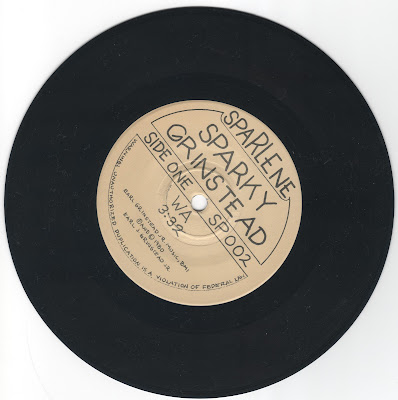What that spell? The twisted tale of Wa
A Look Ahead
Next up will be the follow-up to Won Out, the singular Le Bonx, which I've described as using the same notes as its predecessor only in a different order - as good a description as any as you will see. But first let's take a look at the A-side of the bonus single issued with the second pressing of Won Out a little ditty called "Wa". The final ultimately-dumplity version didn't slip into the stores in final for until the beginning of 1980. Back then you could bring a few of your albums into a record store - even a chain like Tower and ask the manager to carry it. They usually would and take a cut of every copy sold. It was in all of the big stores - Tower, Leopold's and a couple others I've forgotten. I remember one manager looking at the cover and asking me if he should file it under "Soul". I said "put it on" and he played it on the store's stereo. After listen to the first two songs he said "Probably Rock. But you look like a soul guy". I took it as a compliment.
Where "Wa" came from
Gimme a W, gimme an A
What that spell? That spells W
Wa is what that spell
Wa is what that spell
Why do I say Wa?
Why do I say Wa?
Why do I say Wa?
I say Wa 'cause I say Wa
I say Wa 'cause I say Wa
What does it mean?
What does it mean?
What does it mean?
I say Wa means Wa
Wa means Wa
(repeat first verse)
What that spell?
What that spell?
What that spell?
What that spell?
"Wa" is still one of my favorite pieces. To this day I believe that in the right circumstances - the right chain of events - it could very well have been massive. It is a very unusual song, kinda nursery rhyme-ish but at the same time subtly subversive. Kids loved it. Adults would admit that it was catchy but for the most part just raise their eyebrows and back away. It's important to mention here that radio stations did not receive the single with the album. We held it back for a few months so it would have its own impact. We were disappointed when stations that happily played songs from the Won Out album ignored the single despite letters and phone calls from the Sparlene Records publicity machine, I knew "Wa" was unusual, but I thought that the independent-minded program directors and disc jockeys of college radio stations would like it for its uniqueness (it was only later that I learned that "Wa" means "harmony" in Japanese). Boy, was I wrong!
Did we have the unmitigated gall to perform Wa at the 25th birthday party?
You bet we did!
If you should run across a copy of "Wa" in your travels, buy it and give it to me! IGLOO!!!
Some Details from the Detail Box
Things weren't nearly as corporatized back then and managers and program directors had a lot of autonomy. As I said, much of our marketing involved meeting in person with the head honcho or an important underling and working out the deal. If it was too far for a personal visit a letter or phone call would do the trick. We had Sparlene Records and Won Out tees, keychains, pens and pencils. Everybody loves free stuff. I had a bumper sticker on my fabulous 1956 Chevy Bel-Air coupe that read "Support the Arts! Buy My Record!" People would actually stop me and ask about it. I sold several copies right out of the car. It was a fun time.
Todays lesson: I've noticed that people are confusing "weary" which means tired
for example "I worked all night in the salt mine and I'm worn out and weary"
with "Wary" which means cautious
for example "I am wary of working in the salt mine."
Most people making this grammatical error are saying "weary" when they mean "wary"
Mixing these words up can expose you as a person who doesn't know the difference between them. And you have to be wary of exposing yourself this way because people (like me) are growing weary of hearing this mistake.
Got That? Okay. There's gonna be a test!




Comments
Post a Comment